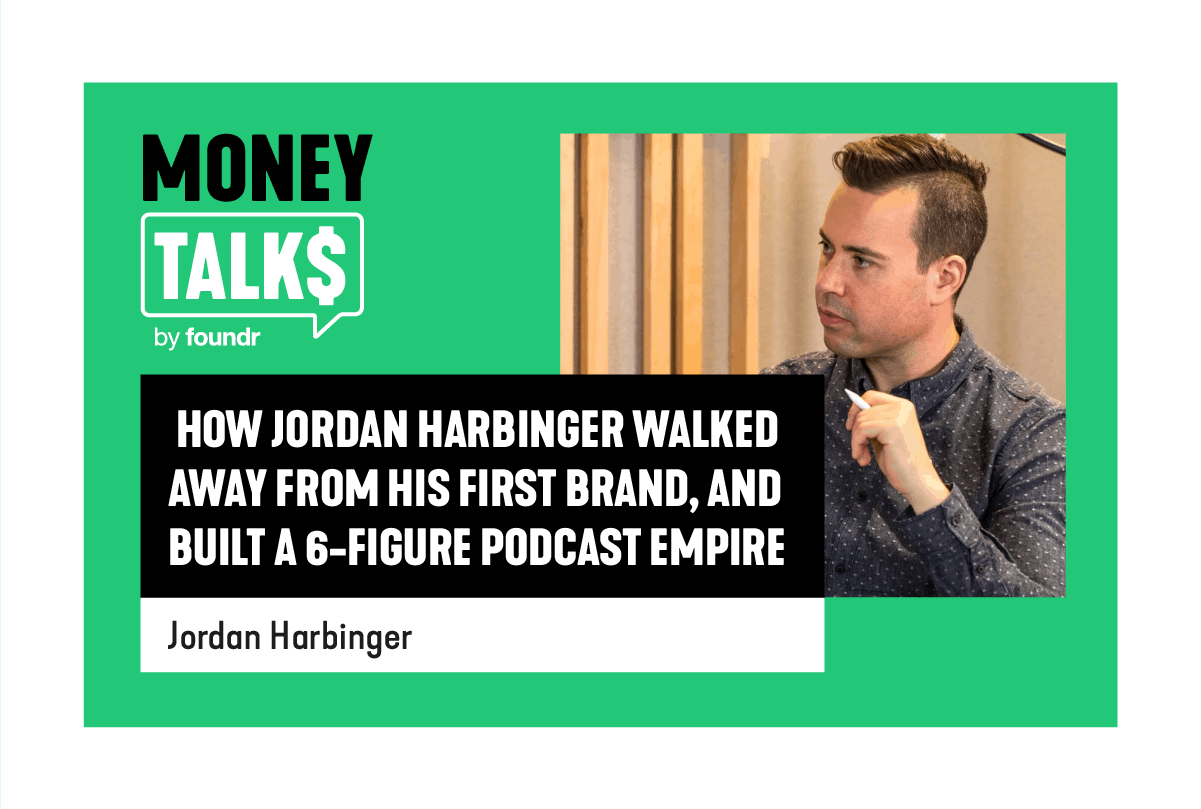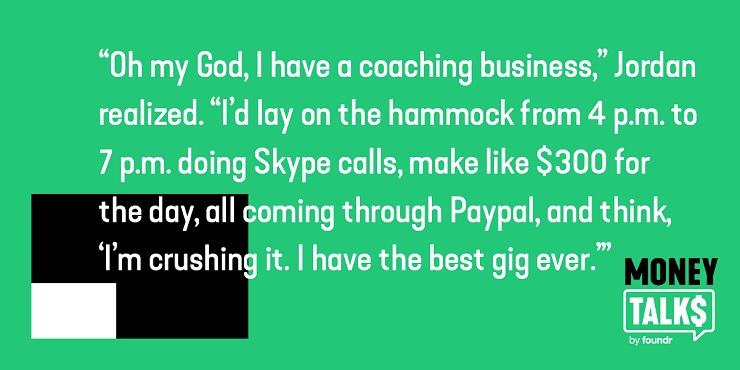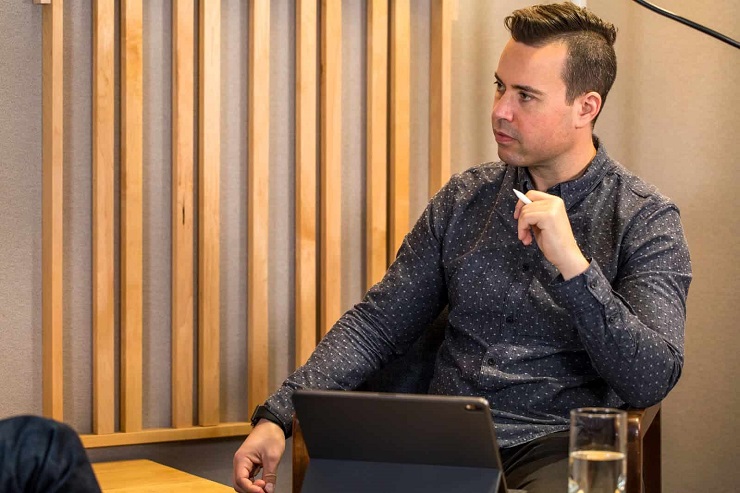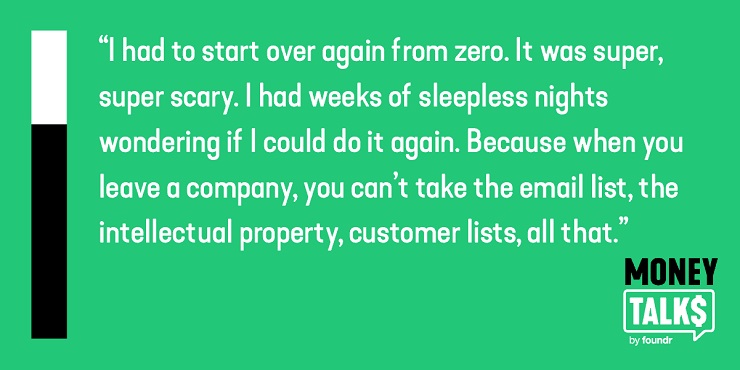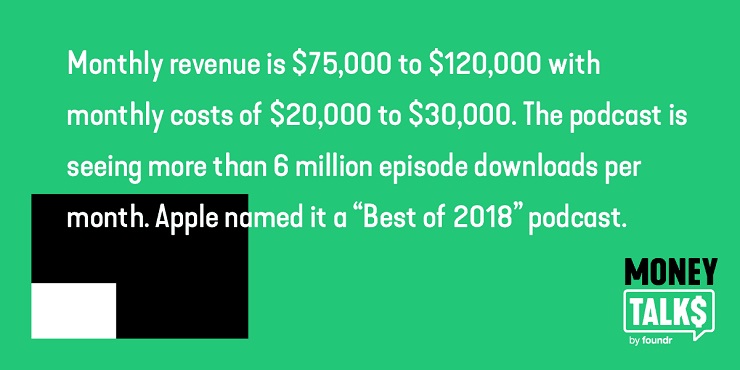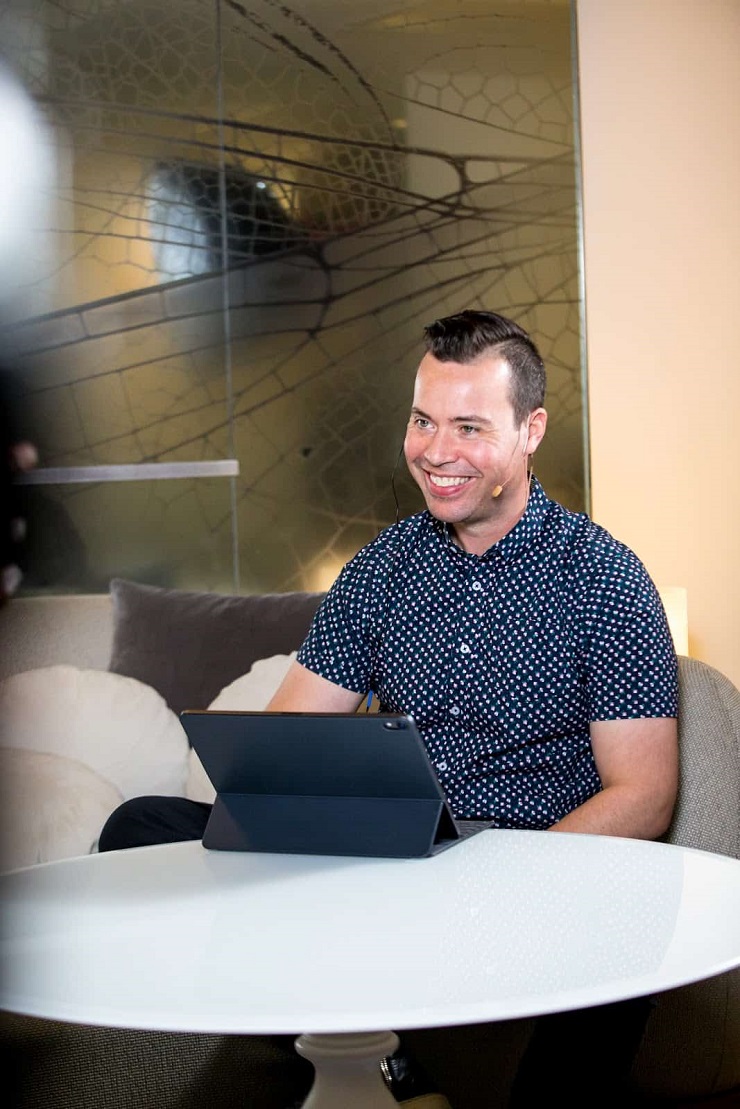Let’s talk money, shall we? In our recurring series Money Talks, we challenge entrepreneurs to be brutally honest about their financial situations—their investments, their profitability (or lack thereof), their money highs and money woes. We’re asking the tough questions and not holding anything back.
In this edition, we get real with Jordan Harbinger, who went through the painful, surprise loss of his first highly successful podcast, only to build a new one that has a larger audience than the first. Jordan gives us the details on pivoting to create one of Apple’s Best of 2018, The Jordan Harbinger Show.
JORDAN HARBINGER
Company: The Jordan Harbinger Show
Niche: Interview-based business podcast teaching networking and communication
Time in Business: Less than 2 Years
Cost to Start: $0
Key Figure: Monthly revenue between $75,000 and $120,000
In a Nutshell: For over 11 years, Jordan Harbinger was the founder, public face, and voice of a brand built on teaching charm and effective communication. As he matured, though, so did his interests. Jordan wanted to focus more on networking and learn from powerhouse business leaders, sharing their knowledge via podcast. Unable to pivot with his business partners’ blessings, Jordan was forced to leave. In 2018, he started “The Jordan Harbinger Show” and was quickly named a “Best of 2018 Podcast” by Apple, growing his monthly downloads to over 6 million and monthly revenue to $75,000-$120,000.
Starting a Business…in a Bar
From an idyllic childhood in Michigan where he and his friends ran all over the neighborhood wreaking havoc, Jordan Harbinger aced high school and headed off to the University of Michigan with a mission of earning a law degree and becoming a Wall Street finance attorney.
His smarts got him through high school. His work ethic got him through college. But for Wall Street? “Everybody was smart and worked hard,” Jordan says. “I had to figure out another edge.”
After noticing his boss was rarely in the office, he tried asking for the “secret cheat code” to get to work from home. His boss quickly set him straight: he wasn’t working from home, he was out getting business for the firm. “So I asked him how that was done and the short answer was: networking. I decided to learn how to do that.”
He read books, took courses, and talked about what he was learning with friends when they hung out in bars at night. In the beginning, women showed more interest than men. They wanted to know how to communicate disinterest without making a guy angry, and how to be their truly nice selves without inviting unwanted advances. Jordan taught them.
Soon, men wanted to know how he was getting attention from so many women. “Well, I just told her how to blow guys like you off, so why don’t you try this other thing—be better, so you deserve what you want (her attention). She’s not interested because you’re clearly fronting and trying to look cool. She’s sick of guys like you. Be open. Vulnerable. Confident.”
Guys started signing up for week-long help, meeting Jordan at nights in restaurants, bars, clubs. They’d pay for Jordan’s meals and drinks, just to be able to learn from him and see him in action. Then those guys started bringing friends. Jordan set up a structure of teaching the same group for a week, a couple of hours a night. He began charging $50 for instruction.
From a Few Hundred to $150K/month
Soon after, he started recording his instruction to CDs and gave them out to guys who needed to catch up on his classes. Those guys shared CDs with friends and asked for more. Jordan began charging $20 for CDs, “So they would be less inclined to lose them, forget them, or just give them away.”
People were ordering eight CDs at a time. Then 20. Jordan was spending all of this free time burning CDs. And then someone told him about “this brand new thing.” Podcasting. He could upload an mp3, others could download it, and he’d break free from the CD burning game.
Jordan launched a podcast, which quickly drew interest from people all over the world.
Requests came in for Jordan to travel to other places and provide his instruction, but he was trying to study for the bar exam in the meantime. He didn’t have time to travel. He did, however, have time to do an hour-long paid consultation via Skype. Initially, he charged $100/hour for online consultations. On the advice of a mortgage banker client, he raised the price to $150/hour, then $200/hour. As he talked about the experience on his podcast, more Skype consulting clients came.
“Oh my God, I have a coaching business,” he realized.
“I’d lay on the hammock from 4 p.m. to 7 p.m. doing Skype calls, make like $300 for the day, all coming through Paypal, and think, ‘I’m crushing it. I have the best gig ever.’”
Then a client paid $5,000 to stay with Jordan for five days, receiving personal instruction and real-world experience in applying it. And the client re-upped, wanting to come again in three to six months. Jordan did it, and talked about it on his podcast.
“We got dozens and dozens and dozens of emails from people saying, ‘I didn’t know staying with you was an option. Where do I send my money?’”
By now, nearly a year had passed since those early days in the bars. Jordan had finished law school, moved to Manhattan and started working as an attorney. He hired a friend to live with him and be the during-the-day instructor. Jordan then took the clients out at night to apply the instruction in the real world.
Coaching revenue grew from those first few hundred dollars to $150,000/month.
Starting From Scratch With Zero Revenue: 11 Years Can Change a Man
Over the ensuing 11 years of revenue and audience explosion, Jordan grew up and entered a new chapter of his life. “I’m in my mid-30s at this point. I’m not interested in talking about dating, meeting women, getting phone numbers, I don’t want to go out to bars and clubs. I’m married. I have a baby on the way. I’m just not interested.”

He began to pivot the podcast, interviewing authors and leaders about a variety of topics from their experiences in the military to the placebo effect on the brain.
“My kid’s gonna Google me one day,” Jordan thought. And he really didn’t want to be the 40-something dad teaching guys how to pick up women in bars. He wanted to be a serious journalist, covering issues of substance that he felt made a difference.
The pivot did not sit well with his business partners. Unable to reconcile their different visions, Jordan found himself suddenly out in the cold: no podcast, no email list, no revenue. Many staff told him they were coming with him, but Jordan was unsure whether he even needed a staff any longer. And he certainly had no way to pay them.
Starting from Scratch with Zero Revenue
“I had to start over again from zero. It was super, super scary. I had weeks of sleepless nights wondering if I could do it again. Because when you leave a company, you can’t take the email list, the intellectual property, customer lists, all that.”
He briefly considered whether he should just go after another job working as an attorney, but ultimately decided that wasn’t for him. His wife helped him get to the next phase.
“You need to toughen up,” she told him. “You’re the only one that doesn’t see that you should build again. All of our friends, the team from before, they’re investing in you. You don’t have the luxury of whining right now. And you don’t have the ability to suss around and be a wimp. Get going. Get on it.”
“So I started again from scratch,” Jordan says, “and it was the best thing that ever happened to me.”
‘Dig the Well Before You’re Thirsty’
When Jordan decided to re-build, he started by doing exactly what he’d been teaching others: he networked. He called 100 people with whom he’d formed relationship over the preceding years. “I dug the well before I got thirsty,” he says.
He let these friends know that he was now off the previous podcast and starting something new. These were very influential, wise friends with successful business endeavors and social media followings of their own.
Each told him the same few things:
- Don’t panic.
- I’ll let my list know you’re starting a new thing.
- Let’s collaborate on something and build you an audience again.
Not everyone he called was able to help, and maybe two in 100 turned him down, he says. But most were surprised to hear what had happened and happy to help Jordan get a new thing going.
On February 22, 2018, the first episode of “The Jordan Harbinger Show” dropped.
He did 140 guest spots on other shows in the ensuing 12 months. (For ideas on how to get others to talk about your product or brand, check out this article.)
In the early weeks after the pilot episode, there were a few thousand downloads a day, which was not sufficient. “I thought it would take 5-10 years to build an audience the size of what I’d had.”
It took 10 months.
When explaining how he did it, Jordan points to the 11 years of work he’d done before launching “The Jordan Harbinger Show.” He went to conferences, met with his show guests, built relationships, answered the phones, and worked directly with people. “While that first business was over for me, all of my relationships were intact.”
Those relationships and that experience helped him set up his new gig well, and get the word out.
How Much Do You Share About What Came Before?
If you’ve had a business situation go south, then you’ve faced that difficult question: How much do I tell about what happened? It can be difficult to find the line between moving on with integrity and feeling like you’re burning bridges.
He learned a hard lesson that is important for all entrepreneurs to consider: if the person with whom you are in business doesn’t have integrity, you should not only sever your connection but also tell others that the person doesn’t have integrity. To do otherwise is to leave your tacit endorsement of that person out there, actively working for the benefit of the person lacking integrity.
“When I was being quiet and classy about it,” Jordan says, “There were people still buying products from my former partners and I was like, ‘Oh, wait, I’m not there anymore,’ and they were like, ‘Wait, what are you talking about? I just paid $8,000. I want to come and work with you.’ I found out that my former biz partner Andrew Kaczorowski was using my last name (Harbinger) as a pseudonym. He’s using the name AJ Harbinger.”
Jordan realized, “I needed to be as public about this as possible because my past 10-11 year endorsement of this company speaks more loudly than this weird silence coming from my camp.”
Is Jordan, the consummate networker, advocating burning a bridge here?
“If you’re dealing with someone who has low integrity, there should be no bridge there in the first place,” he says. “You being nice to them isn’t going to stop them from screwing you over. Why would you think that? You’re just being naive.”
Today’s Success Picture
Today, 18 months from the launch of the first episode, Jordan’s podcast makes its money from advertising. PodcastOne handles finding and securing advertisers and even helps with guests. Monthly revenue is $75,000 to $120,000 with monthly costs of $20,000 to $30,000.
He’s seeing more than 6 million episode downloads per month. Apple named it a “Best of 2018” podcast.
Jordan also makes money from his consulting contracts with military, intelligence agencies, and corporations. Only Jordan’s wife, Jennifer, is a full employee. They have half a dozen contractors who help edit and produce the podcast, write notes for the shows, and write for the blog.
While his blog has about a million monthly visitors, it is not a revenue source. He uses it to aggregate content for a future book and test out show topic ideas. By fleshing out topic ideas there, Jordan also has created an array of options for potential future educational course collections. He posts weekly.
Advice You’re Gonna Love
If you are an entrepreneur who just wants to be about what you’re about, tired of hearing how you must spend time researching keywords and optimizing for clicks, you are about to fall in love with Jordan Harbinger’s approach to his blog.
“I don’t optimize for search traffic because I’ve found that’s what low-end websites do.”
He explained that many people see that a lot of people are searching for a particular keyword—blockchain, for instance—so they write a long article about blockchain.
“But there’s less traffic on the last mile, right?” Jordan says. He’s drilled into his core subject matter—networking. That, in turn, means his site comes up in searches and Quora articles about networking.
If you decide to write one-off articles on keywords that are being searched at that time, you aren’t creating a robust body of content. That means you are not going to beat out the guy who is creating a large body of content that is consistently about the given keyword.
“As a creator, if you want good stuff created, you have to create based on what you like,” Jordan advises. “It’s like an artist. They’re painting based on what they like. They’re not asking themselves, ‘What are people buying?’ It’s art. It’s a creative pursuit. Focus on your strengths and double, triple down on those.”
Battling for one-off keywords leaves you in a losing battle, according to Jordan. “You’re always going to lose to the person who has another million dollars to spend on AdWords.”
Your Turn
When you’ve finished happy dancing from Jordan’s advice above, tell me what you think. Have you used your network in the way Jordan did? Have you experienced a business pivot like this? How did you navigate yours? Let’s hear from you!
Subscribe here to be notified when we drop the next Money Talks article.
